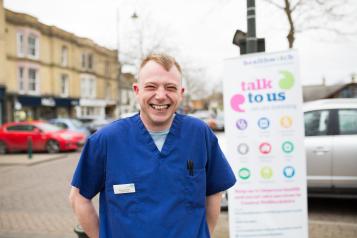New Government Plan for Patients

What’s in the plan?
The government say they want to make sure people receive the best possible care whenever they need it. That means having a GP appointment or being diagnosed or receiving treatment quickly when required.
They are prioritising action across 4 key areas:
- Ambulances
- Backlogs
- Care
- Doctors and Dentists
They plan to help people to be better informed about how to prevent the need for healthcare in the first place and how to access healthcare.
Ambulances
They plan to support ambulance services to operate more effectively for this winter and next.
They are aiming for shorter response times enabled by quicker handover of patients so ambulances can get back on the road and respond to 999 calls. With a foucs on:
- working with NHS111 and ambulance services so that patients are directed to the full range of services, for example, dedicated 24/7 helplines for patients experiencing a mental health crisis
- increasing the number of call handlers to 4,800 in NHS 111 and 2,500 in 999 by December 2022.
- supporting the NHS to better redirect patients to the most appropriate setting for them, such as urgent care centres, walk-in centres or minor injuries units
- expanding the use of remote monitoring of patients at home, where it is safe to do so, so that fewer people need to be admitted to hospital
- supporting the local NHS to expand falls prevention and falls response services, to avoid unnecessary ambulance call-outs and emergency admissions
- opening up the equivalent of 7,000 beds so that every hospital has space to see and treat patients more quickly. This includes treating more people at home or in the community, enabled by remote monitoring.
Backlogs
The pressures of the pandemic have led to delays in expected treatment. The waiting list for planned care stands at around 7 million and will probably increase as more patients come forward for diagnosis and treatment.
They plan to:
- reduce waits further, including eliminating waits of over 18 months by April 2023, over 15 months by March 2024, and over a year by March 2025.
- prioritise patients who have been waiting longest and those needing treatment most urgently.
- maximise the use of the independent sector
- make changes to help retain doctors, nurses and other senior NHS staff and recruit 50,000 more nurses by 2024.
- increase the use of virtual outpatient appointments
- expand mental health support
- increase the number of community diagnostic centres to help with earlier diagnosis closer to home.
Care
To improve social care they plan to:
- help people get out of hospitals and into social care support, by launching a £500 million Adult Social Care Discharge Fund which will bolster the social care workforce and free up beds for patients who need them.
- launch the next phase of their recruitment campaign to encourage more people to join social care workforce.
- support progression for care workers and registered managers.
- invest £15 million to help boost international recruitment of care workers.
- free up time to allow carers to care by using Digitised social care records
Doctors - GPs
Making an appointment in general practice has become more difficult in recent years. The plan says that:
- everyone who needs an appointment with their GP should get one within 2 weeks
- patients with urgent needs should be seen on the same day
- there should be more than a million extra appointments over winter
- an additional 31,000 phone lines will be made available for GP practices. From January 2023, they will speed up the delivery of high quality ‘cloud-based’ telephone solutions.
- they will publish data on how many appointments each GP practice delivers, and the length of waits for appointments, to enable patient choice
- the local NHS (Integrated Care Boards) will hold practices to account, providing support to those practices with the most issues to improve performance
- They will expand the range of services available from community pharmacies, freeing up GP time for more complex patient needs. Pharmacists will be able to manage and supply more medicines, without a prescription and eventually be able to do more simple diagnostic tests.
Dentists
In too many areas, patients struggle to make an appointment with an NHS dentist. To address this, they have already started changing the dental contract to incentivise dentists to do more NHS work and take on more difficult cases. They are also making the following changes:
- From November 2022, it will be easier for patients to see information on the NHS website as to whether practices will treat new patients, as it will be compulsory for practices to keep this up to date.
- They are amending the law to allow the General Dental Council to simplify registration for dentists not trained in England, so that they can start practising in the NHS more quickly.
Response
There has been a mixed response to the Government’s plan, some suggesting it does not go far enough to address the issues of the NHS. One example is that the 2 week GP appointment deadline is not a new mandatory or legal part of NHS GPs’ contract. Workforce shortages or other factors may stop it being delivered in our area.
GP access is by far the most common frustration people have been raising with us for the last two years, and we know barriers at the front door of the NHS can create very serious problems further down the line. Bringing in more support staff and improving phonelines will provide much needed reinforcements for GP surgeries and help them make the process of getting an appointment more efficient and easier for everyone.
As we head into the winter months the NHS is going to face pressures across the whole system, while managing the backlog in diagnostics and surgery that built up as a result of the pandemic. GP practices, as the vital first port of call for most people, need to be supported to make sure everyone who needs care is able to access it in a timely and appropriate way.
We are bitterly disappointed that NHS England has chosen to ignore the appeals from the profession and the needs of patients in today’s letter.
Despite our best efforts to outline a number of positive and constructive solutions that would make a difference to practices’ ability to improve care for patients, NHS England has instead decided to follow a path laid out three years ago, long before the arrival of Covid-19, and roll over a contract that fails to address the current pressures faced by general practice. …GPs and practices will see today’s changes as devaluing their goodwill and demolishing their spirit. The letter does nothing to capture the scale of changes needed nor safeguards patients.


